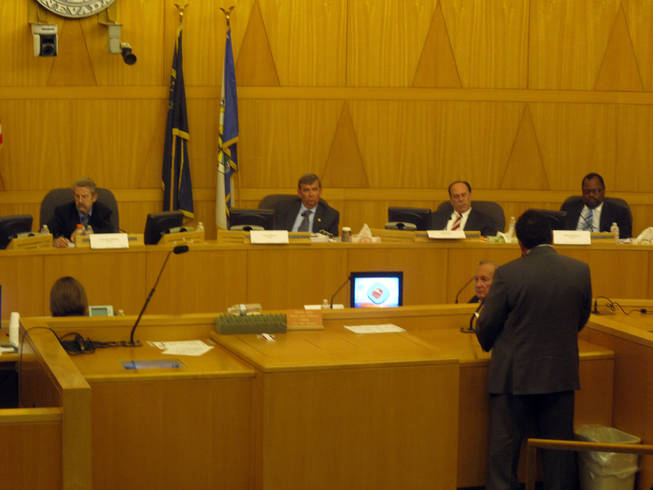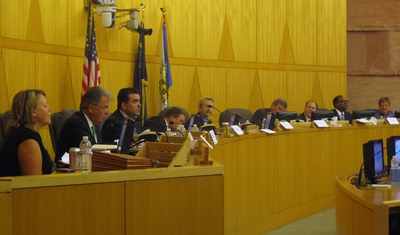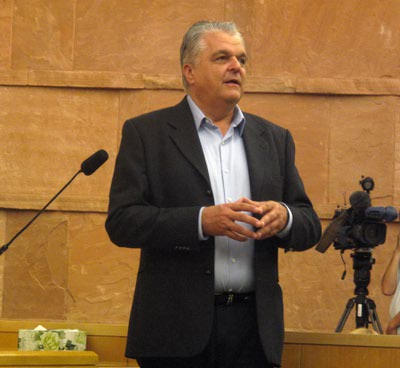
Jose Solorio, 51, speaks Monday to a nine-member panel reviewing the coroner’s inquest process.
Tuesday, Oct. 19, 2010 | 12:56 a.m.

A nine-member panel meets Oct. 18 in the Clark County Commission chambers to discuss the coroner's inquest process and listen to public feedback. From left are Margaret McLetchie, Bill Maupin, John Fudenberg, David Roger, Christopher Blakesley, Doug Gillespie, Phil Kohn, Richard Boulware and Chris Collins.
Sun archives
- Group to propose changes to coroner’s inquest process (10-5-2010)
- Police officers found justified in Erik Scott shooting; family plans lawsuit (9-28-2010)
- Detective: Erik Scott had pain medicines from several doctors (9-27-10)
- Witnesses give conflicting accounts of Costco police shooting (9-25-10)
- Shoppers recount police shooting outside Costco (9-24-2010)
- Officer in Costco shooting says man raised gun, didn't know it was in holster (9-23-2010)
- Inquest testimony focuses on Erik Scott’s use of prescription drugs (9-22-10)
- Woman says fiance had his hands up when shot by police (8-20-10)
- Vegas police study policy after drug raid slaying (8-4-10)
Ed Uehling started his statement by offering friendly congratulations to the nine members serving on a committee reviewing the coroner’s inquest process.
Then he extended his thanks to the Clark County Commission for organizing the review panel.
Then, for the next three-and-a-half minutes, Uehling ripped the system.
“The coroner’s inquest is one of the worst examples of injustice in our society,” Uehling told the panel Monday at its first meeting. “To have a process that has so many defects is just appalling.”
Uehling was one of about 40 people to attend the meeting of the Coroner’s Inquest Review Panel at the Clark County Commission chambers, 500 S. Grand Central Parkway.
It was the first of four public meetings the panel will conduct to review the coroner’s inquest process and recommend possible changes. Inquests are held in cases of police shootings to determine whether they are justified, excusable or criminal.
The first and lengthiest topic discussed by the panel was the ultimate purpose of the coroner’s inquest.
The panel examined the fact-finding role, whether or not a verdict should be rendered and possible alternatives to a verdict.
Throughout the discussion, the panel used the inquest process from King County, Wash., as a reference for comparison.
King County’s inquest allows an attorney for the victim’s family to cross-examine witnesses and officers involved in a shooting, which is not allowed in inquests conducted here.
Chris Collins, executive director of the Police Protective Association, was wary of that structure, saying it would turn a neutral fact-finding process into an adversarial one.
“We’re talking about men and women in law enforcement who, at this point in the process, have been charged with no wrongdoing,” Collins said. “If the process becomes so adversarial that the officers refuse to participate in it, then you’ve lost the transparency we are trying to save.”
After hearing concerns from ACLU representative Margaret McLetchie and NAACP representative Richard Boulware about the public’s perception that Metro police and the District Attorney’s Office work too closely together in inquests, Sherriff Doug Gillespie suggested an alternative.
Gillespie proposed having a group of lawyers become familiar with the inquest process and become independent presenters of the facts, effectively removing the DA’s office from the process.
“Sometimes when we discuss these things, we tend to get a little too focused on what other communities do,” Gillespie said. “Maybe the answer for Las Vegas and Clark County is not having a family attorney question the witness. Maybe we have an independent presenter of the facts.”
McLetchie agreed to an extent but said it was important to have the victim’s family and their attorney actively involved.
“I don’t have a goal to hold police officers accountable or not. What we’re concerned about is coming to the truth,” McLetchie said.
The panel also discussed whether Metro officers involved in a shooting should undergo a drug test. Because drug tests are union-negotiated, county commissioners cannot vote on the issue.
Collins said he had no issue with the measure but objected to personal medical information about officers being made known to the public. He said he was unsure how officers would respond to such a measure.
“I don’t think it’s anyone’s business what prescription drugs those officers take in the prescribed doses,” Collins said. “As far as if they’d accept it, I don’t know.”
At the end of the discussion, those attending the meeting had a chance to speak for up to four minutes.
A total of 11 people addressed the panel — all of them critical of the process. Three were members of Hispanic organizations who said they were disappointed there are no Hispanics and only one woman on the committee.
“I have to express disappointment in the composition of this panel. I’m dismayed we only have one woman on the panel,” Vincenta Montoya said. “This is necessary. You need to have a Latino’s presence and you need to have a greater women’s presence.”
Lisa Mayo-DeRiso, a spokeswoman for the family of Erik Scott, who was shot and killed by police in May outside the Summerlin Costco, complained that the family was not provided more information from authorities before the inqeust.
“Being able to get the facts prior to the inquest is invaluable,” DeRiso said. “As I stand before you today, we have yet to receive a police report, an investigative report or anything of that matter for the family.”
Uehling, meanwhile, said the current process functions to debase the victim and does not work.
“There’s no way the police department can investigate itself. No agency can investigate itself,” Uehling said. “The presentation is all about impugning the victim and the victim’s families.”
The panel will holding meetings at 5 p.m. at the commission chambers for the next three Mondays. The panel plans to vote at its final meeting on changes to recommend to the commission.
“The real results of this are going to come with what kinds of changes this panel is going to recommend,” Mayo-DeRiso said. “The truth isn’t always placing blame somewhere. It’s just the facts and the truth.”


Join the Discussion:
Check this out for a full explanation of our conversion to the LiveFyre commenting system and instructions on how to sign up for an account.
Full comments policy